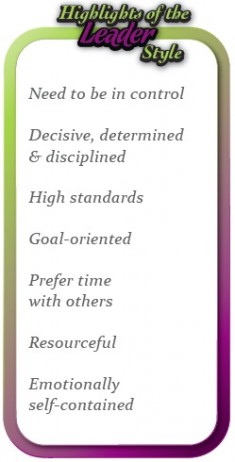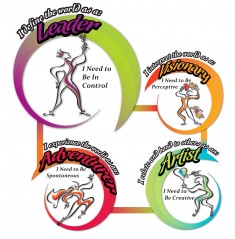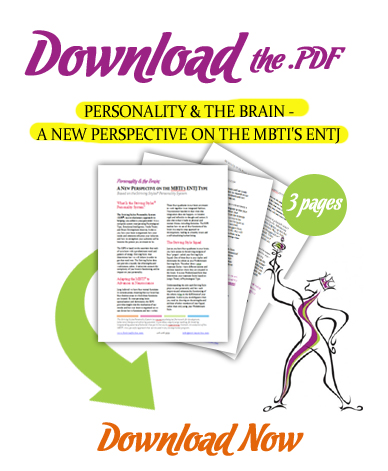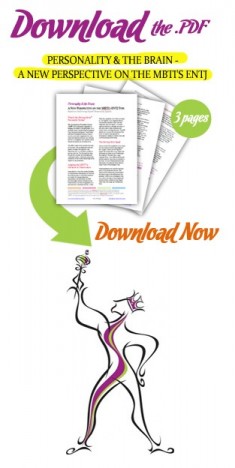Personality & the Brain - A New Perspective on the MBTI's ENTJ
Personality & the Brain - A New Perspective on the MBTI's ENTJ
Through the lens of the Striving Styles, each of the Myers-Briggs (MBTI®) 16 Types comes alive. Discover which quadrant of the brain the ENTJ prefers to use, what the predominant, innate psychological need that drives the ENTJ's behavior is, as well as how an ENTJ can leverage their whole brain in order to develop and achieve their potential.
Four Quadrant Model of the Brain
The SSPS shows that each of the four quadrants of the brain has their own role, or function, to play in our personality and our consciousness. Based on Jung's Theory of Psychological Type, we are hard-wired to prefer one function or quadrant over the others and we use each quadrant or function in either an inwardly or an outwardly way.
The ENTJ's Predominant Striving Style is the Leader, which is rooted in the left rational brain (Jung's Thinking function) and focused externally. This is the part of the brain responsible for self-regulation, or the management of impulses and emotions. The purpose of the left rational brain is to decide and it likes to do this swiftly, sometimes with minimal input. It helps us to consider objectively and dispassionately what needs to be done, how soon it needs to be done, and who must do it. It decides things in a reasoned and logical fashion, considering how everything fits in a well ordered world. It decides what we need to do to get to where we want to go.
If the left rational brain could talk, it would say things like, “Hey, nothing personal, but I’m sorting you into the ‘people who have done me wrong’ category or the ‘People Who Are Like Me’ category,” The left rational brain doesn’t “feel” any particular way about all this information; it just goes about its tidy, analytical way, keeping track of what’s what.
Drivers of Human Behavior: Needs & Emotions
Each of us is driven by powerful, instinctual needs and have been since birth. These needs are a source of motivation and influence our behavior. When our predominant need is met, we are poised for growth. When our need is not met, fear and anxiety override rational, leading to self-protective or survival behaviors.
ENTJs, as Leader Style people, have a predominant need to be in control. These assertive and decisive individuals seem to go through life defining their environment and everyone in it. Leaders are perhaps the most self-confident of the Striving Styles. They enjoy taking charge and the ease with which they do so makes them seem like they were born to lead.
When their need to be in control is frustrated, the Self-Protective System of the Leader (ENTJ) is activated, causing survival behaviors to emerge including:
- excessively self-confident and appear pompous and arrogant
- can overpower and attempt to control people to get own way
- can be 'married to their work'; be perceived as cold and unfeeling
- are impatient and impulsive, taking action just to 'do something'
Using the Whole Brain: Striving Style Squad
Going beyond the descriptors of the MBTI, the SSPS shows people how to access and integrate all four quadrants of their brain in order to use their whole brain as it is intended. There are four Styles that make up a person's Striving Style Squad, each with its own role to play in our personality based on where they reside in the brain.
The Striving Style Squad for the ENTJ is: Leader Predominant Style with Visionary, Artist & Adventurer Associate Styles. Each Associate Style on the Squad also has a specific need that must be met and different innate talents that allow it to meet that need. Often, we neglect the development of the Associate Styles, resulting in the overuse of our Predominant Style which is a detriment to our confidence and mental health.
If we are not using the appropriate quadrant of our brain and its associated Style for its intended purpose, we end up using a different part of our brain in a way that it was not intended to be used. This can limit our flexibility, drain us of valuable internal resources, and ultimately thwart our development and growth in life.
Want to know more about the Striving Style Squad of the ENTJ? Download our PDF now! To learn about the other MBTI Types, click here.


Striving Style Squad of the ENTJ - this image shows the four brain quadrants of the ENTJ and the corresponding Striving Style in each quadrant. Learn more in the download!

Register for our upcoming complimentary webinar on how to integrate neuroscience and emotional intelligence with your understanding of personality type. Or, fast track your ability to use the SSPS with one of our approaches designed for MBTI Practitioners. Learn more...








